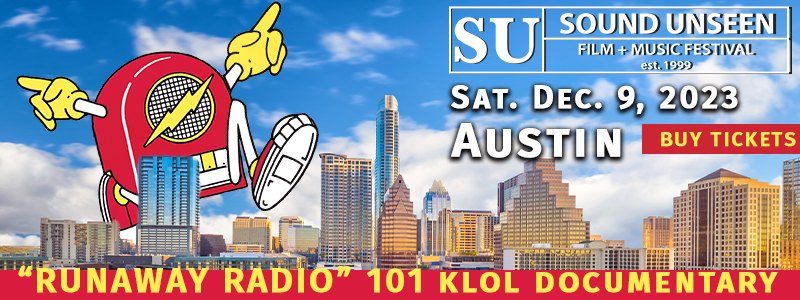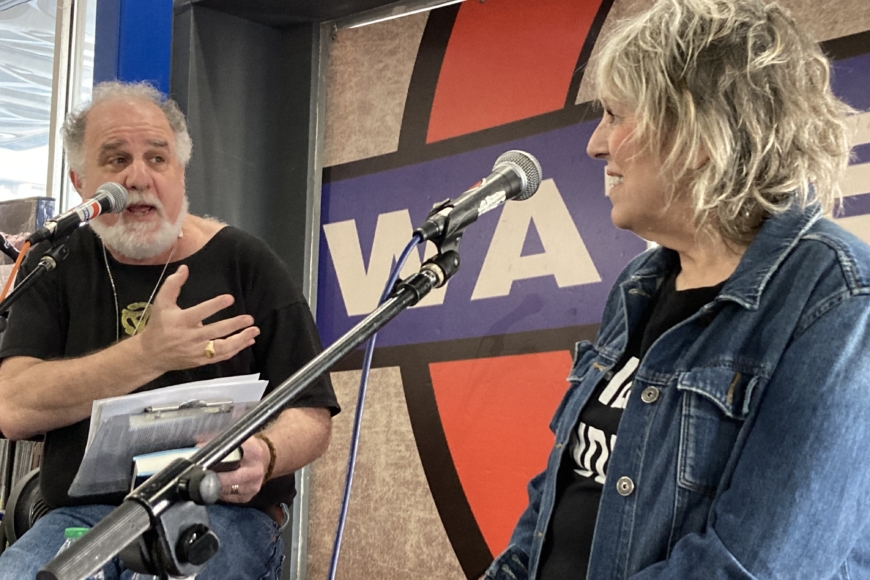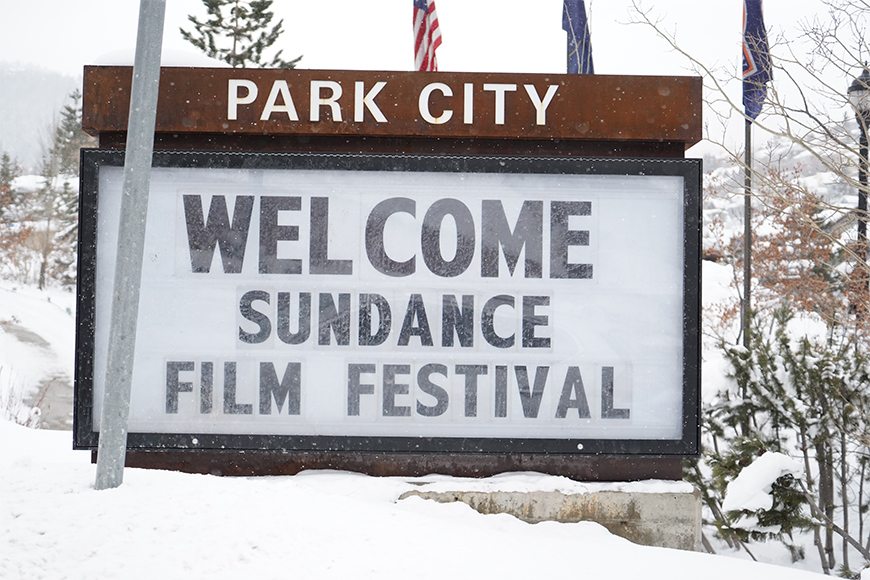Jeffrey Brown is the producer of a film that is going to be screening during the Sound Unseen Festival this Saturday at 4:30p at AFS Cinema. It’s called Runaway Radio.
Matt Reilly / KUTX Program Director: Jeffrey, you and I ran into each other during South by Southwest last year, and you were telling me about this and it immediately piqued my interest because I grew up in Houston. And you told me you’re working on a film about this iconic Houston rock station which I grew up listening to. So there’s lots to talk about here, but first of all, how did this project come about, and why this radio station?
Jeffery Brown / Runaway Radio Producer: So the project is Mike McGuff’s project. He was about the same age as you, late 40s. It was his go-to station and he listened to rock radio growing up. And so it’s [this is] his first documentary film.
Mike was more of a television journalist for years in Houston, and now has a well-known blog that people follow on Texas media, especially Houston. And so he’d been wanting to make a documentary for a while, and this was something that was near and dear to his heart. And so it was the right one. We’ve worked together to add some names Lyle Lovett, Sammy Hagar, Melissa Etheridge and Dusty Hill.
Matt Reilly: Well, so I have not seen the film. And what I’m curious to see is if it encapsulates is this time that no longer exists—because of the way the business has changed.
So I run a radio station. I grew up listening to this radio station and so much of what you hear on KUTX can be traced back to what I heard as a kid on KLOL in Houston. For good and for bad. So I learned what great radio could be. But then I also learned what bad radio is. And so there are times when I would get really frustrated with the radio station because they would show these glimmers of hope.
You know, they would have these specialty shows at night. . . on the weekends that were really cool. And then, you know, sometimes their daytime program would introduce me to new artists or, you know, classic rock artists I didn’t know in the past. But then they would veer off, you know. The late eighty’s, early 90s were just this sort of wasteland because of hair metal and they were really all in on that. But the personalities, and I think this is where the documentary is really about, the deejays, the jocks that bring this thing to life.
Jeffery Brown: Yes. You know, it was theater of the mind. So remember, before our lives went digital, you got your information from these deejays. And so these deejays were very powerful. They became part of our lives and were part of the community. KLOL especially was involved in so many different projects outside of just bringing you rock music. At the same time, we look to these deejays to be more knowledgeable about the bands, and about the music. Lyle Lovett brings it up. He talks about it in his interview that that’s maybe one thing that’s missing now in terms of the way we get our music is we don’t have someone telling us about these artists.
Matt Reilly: And which I will say is part of what. We do here is, you know, if you listen, KUTX, you obviously know that we might talk too much. But it’s in service of the music. And that’s how it used to be.
Jeffery Brown: Exactly. And that’s why they held a dear place in the community. And, you know, in a lot of ways, they became very important in people’s everyday lives. And that led to them becoming part of the community. And so when you went to a concert and you saw them up there introducing Z.Z Top or introducing Kiss or whoever it is.
Matt Reilly: You know, like Outlaw Dave.
Jeffery Brown: Outlaw Dave is still going. But people were crazy about these folks. And they really did hold an important part in our lives.
Matt Reilly: So when you were reaching out to celebrities, were they immediately receptive? Did they know exactly what you were talking about when you brought up KLOL?
Jeffery Brown: Of course. We chose people who had a special relationship with the station and had something to say. So Lyle Lovett, he grew up in Houston, so he goes way back with the station because he listened to Crash Collins growing up. You know, he knew what it was like. And so his was really in the early 70s when it was more of a progressive station and these deejays could play whatever they wanted. You know, and times change.
And we focus on that quite a bit as it goes from a progressive station in the 70s to more of an album rock station. And those were kind of the powerhouse days of KLOL as well, when classic rock was king. And so if you’re going to make a film about rock music in Houston, Texas, you got to have ZZ Top. These are the reasons why we’ve chosen these people. Sammy Hagar was always huge in Texas. If you look back, Sammy Hagar would play everywhere. In Texas. He played Odessa, Midland, El Paso, and Brownsville in addition to Houston, San Antonio, Austin, Dallas, and Fort Worth. He would play everywhere and he was huge. And he had a special relationship with Dana Steel, who promoted him. And even now he tours, you know, he puts out new albums, but it’s still “I Can’t Drive 55”, which still is making him money these days and still gets most of his radio play.
Matt Reilly: And that’s how I learned about him is through KLOL.
Jeffery Brown: So that’s the reason we focused on him. And then Melissa Etheridge goes way back with Dana. And there’s a very funny story about her playing. Dana didn’t show up and there’s some back and forth and people giving out private numbers and stuff like that on stage. And I don’t want to ruin it in the film. But these people had a special hook and were getting great promotions and had a special relationship.
Matt Reilly:When you’re talking to these veteran radio staffers, I should say, do they talk at all about sort of the big changes in the industry that happened; in the tightening that they had to go through in order to just keep jobs?
Jeffery Brown: Yes. And we get into the Telecommunications Act of 1996, and that was kind of the game changer. And we talk we talked about how you could come into one market and own several stations, and that was kind of the beginning of the end in a lot of ways for stations like a KLOL because it got rid of local ownership. KLOL was Houston you know, it was a Houston station, and all of a sudden people were trying to use what worked in Cleveland does not necessarily work in Houston, or what works in L.A., or Boston or wherever it is. Minneapolis does not necessarily work in Houston, and people are trying to do that. And it just got very generic. And when things get generic, and when the music industry started to die, when people started getting involved who weren’t in love with music. But back in the 70s, people did. People wanted the music. Because they loved music. When it became a lucrative job, then things kind of changed. And it’s the same thing with radio that you would see if the people were coming into Houston and owning several stations in the same market and KLOL suffered because of that.
Matt Reilly: Yeah, localism is a big part of what we do here. Obviously, streaming services weren’t around in the 70s, 80s, 90s, early aughts. And now that we have all these options, we find that being local is the only way to stay relevant to many people. But I remember being a kid in like Stevens and Pruitt, it was the big morning show and that was our version of Shock Jocks and Eddie the Boner Sanchez was their sort of intern guy who would go out and do their pranks. But they were on commercials, you know, for A.W. Marx Jewelers, for example. But what a cool radio station in a big city like Houston can do is it can create sort of a sense of community. And there were inside jokes. But I think there’s something that gets lost with giant corporate ownership.
Jeffery Brown: This is a perfect story of that. You know, when someone’s running your station and they’re not local, you’re not really learning that much, maybe once in a while. But, you know, this whole idea of someone who has their ear to the ground and can tell you things you can, and then you’re coming in to listen for that piece of news, or that just that wisdom, or just that piece of information you can’t get elsewhere. And it’s worth your time to tune in. But once that’s lost, then people are going to go elsewhere.
Matt Reilly: We call it generic Kona.
Jeffery Brown: Yeah. And you know, there are lots of reasons for the demise of KLOL. Well, it was also the introduction of the Internet, and people started getting their music in different ways. It was also a reflection of Houston just becoming more Hispanic and more Latin and those stations being more profitable. But, it was also alternative radio, you know, so you had alternative stations coming and music tastes were changing. Grunge became big, alternative rock bands like Green Day and Pearl Jam.
Matt Reilly: So it was actually a show on Sunday nights on KLOL called “Exposure” David Sadoff. I listen to that religiously and I was the first time I ever heard Nirvana, Pearl Jam, Soundgarden. He would play the Pixies. And so that was the testing ground for all the grunge bands. And then one day we got to hear the, you know, smells like Teen Spirit next to Whitesnake. And it was like, Oh, wow. So this is what it could be. And I got kind of frustrated because there were shows like Exposure where he was playing all this cutting edge stuff, and then they were trying to sort of shoehorn it next to Styx or whatever. But these were very fascinating to watch. And I’m just fascinated by this topic because I’m sure in any given city, you know, especially big cities, that you could find that, you know, a station like this
Jeffery Brown: Right. And in the same thing was probably happening in most big cities in Dallas-Fort Worth. And then all the sudden these alternative stations, there was enough alternative music to sustain themself and Exposure, you know, went from being this, you know, special situation in KLOL where there were full stations focusing on that. And one of the program managers is part of a through line let’s say of the story is the general manager Pat Fant. Pat was at KLOL from the start and then he went to the alternative station after that. So, you know, in radio I think you sometimes after a role where you have a job. Particularly commercial.
Matt Reilly: Fantastic! So there’s going to be a Q&A after the film. Okay. So we’ll get to watch the movie at 4:30p at AFS Cinema as a part of Sound Unseen 2023



